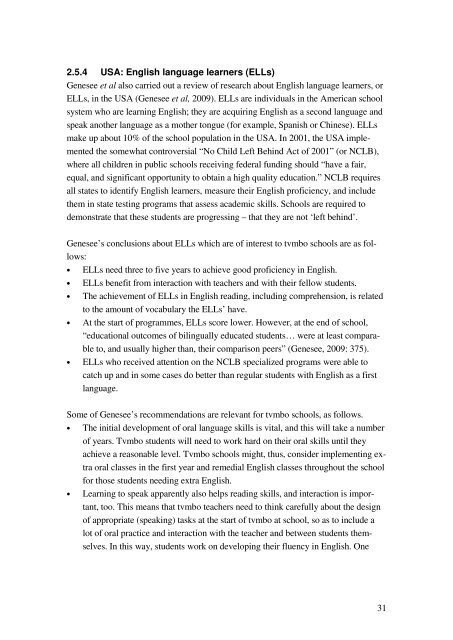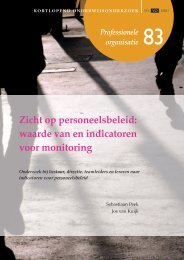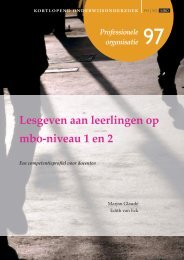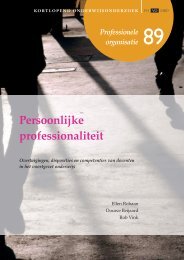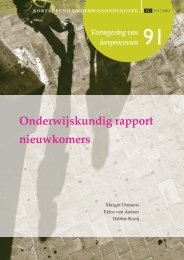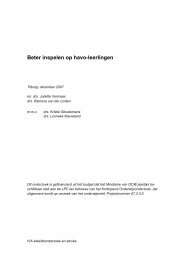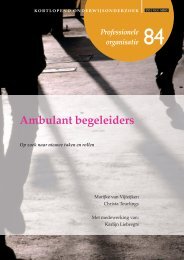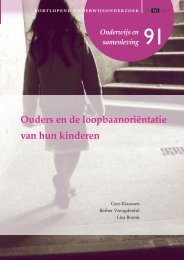Proud to be tvmbo - Kortlopend Onderwijsonderzoek
Proud to be tvmbo - Kortlopend Onderwijsonderzoek
Proud to be tvmbo - Kortlopend Onderwijsonderzoek
Create successful ePaper yourself
Turn your PDF publications into a flip-book with our unique Google optimized e-Paper software.
2.5.4 USA: English language learners (ELLs)<br />
Genesee et al also carried out a review of research about English language learners, or<br />
ELLs, in the USA (Genesee et al, 2009). ELLs are individuals in the American school<br />
system who are learning English; they are acquiring English as a second language and<br />
speak another language as a mother <strong>to</strong>ngue (for example, Spanish or Chinese). ELLs<br />
make up about 10% of the school population in the USA. In 2001, the USA implemented<br />
the somewhat controversial “No Child Left Behind Act of 2001” (or NCLB),<br />
where all children in public schools receiving federal funding should “have a fair,<br />
equal, and significant opportunity <strong>to</strong> obtain a high quality education.” NCLB requires<br />
all states <strong>to</strong> identify English learners, measure their English proficiency, and include<br />
them in state testing programs that assess academic skills. Schools are required <strong>to</strong><br />
demonstrate that these students are progressing – that they are not ‘left <strong>be</strong>hind’.<br />
Genesee’s conclusions about ELLs which are of interest <strong>to</strong> <strong>tvmbo</strong> schools are as follows:<br />
• ELLs need three <strong>to</strong> five years <strong>to</strong> achieve good proficiency in English.<br />
• ELLs <strong>be</strong>nefit from interaction with teachers and with their fellow students.<br />
• The achievement of ELLs in English reading, including comprehension, is related<br />
<strong>to</strong> the amount of vocabulary the ELLs’ have.<br />
• At the start of programmes, ELLs score lower. However, at the end of school,<br />
“educational outcomes of bilingually educated students… were at least comparable<br />
<strong>to</strong>, and usually higher than, their comparison peers” (Genesee, 2009: 375).<br />
• ELLs who received attention on the NCLB specialized programs were able <strong>to</strong><br />
catch up and in some cases do <strong>be</strong>tter than regular students with English as a first<br />
language.<br />
Some of Genesee’s recommendations are relevant for <strong>tvmbo</strong> schools, as follows.<br />
• The initial development of oral language skills is vital, and this will take a num<strong>be</strong>r<br />
of years. Tvmbo students will need <strong>to</strong> work hard on their oral skills until they<br />
achieve a reasonable level. Tvmbo schools might, thus, consider implementing extra<br />
oral classes in the first year and remedial English classes throughout the school<br />
for those students needing extra English.<br />
• Learning <strong>to</strong> speak apparently also helps reading skills, and interaction is important,<br />
<strong>to</strong>o. This means that <strong>tvmbo</strong> teachers need <strong>to</strong> think carefully about the design<br />
of appropriate (speaking) tasks at the start of <strong>tvmbo</strong> at school, so as <strong>to</strong> include a<br />
lot of oral practice and interaction with the teacher and <strong>be</strong>tween students themselves.<br />
In this way, students work on developing their fluency in English. One<br />
31


